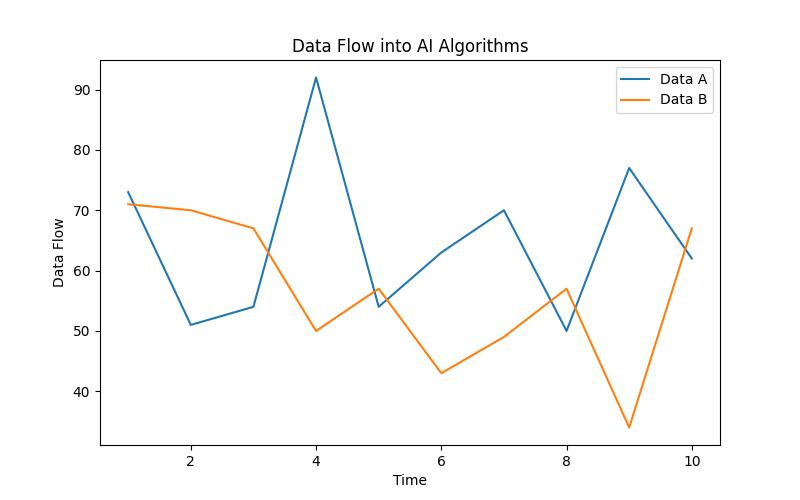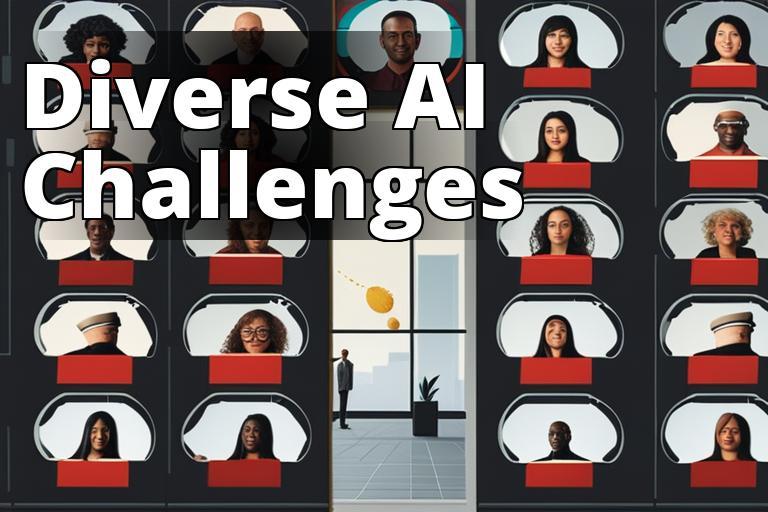Artificial Intelligence (AI) has emerged as a transformative technology with the potential to revolutionize various industries and sectors. However, developing AI software in the context of developing countries presents unique challenges that need to be addressed to harness the full potential of this technology. In this article, we will explore some of the critical challenges faced in developing AI software for developing countries and strategies to overcome these obstacles.

Contents hideChallenges in Developing AI Software for Developing Countries
Readers will learn about the challenges in developing AI software for developing countries, including access to data, infrastructure limitations, language and cultural diversity, lack of technical expertise, ethical and regulatory considerations, financial constraints, adapting AI solutions to local contexts, data privacy and security, bias and fairness in AI software, and accessibility and inclusivity.
– Limited access to high-quality, diverse datasets
– Challenges with internet connectivity and power supply
– Shortage of local expertise and financial constraints
Access to Data in Developing Countries

Importance of Data in AI Development
Data forms the cornerstone of AI development, serving as the fuel that powers machine learning algorithms and enables the creation of intelligent software. High-quality, diverse datasets are essential for training AI models to perform effectively across various applications.
Limited Access to High-Quality, Diverse Datasets
Developing countries often face challenges in accessing high-quality, diverse datasets due to factors such as limited digital infrastructure, data collection mechanisms, and privacy concerns. This limitation can hinder the development of robust AI algorithms capable of addressing the unique needs of developing country contexts.
Implications for Developing Robust AI Algorithms
The scarcity of quality data in developing countries can lead to biases and inaccuracies in AI models, impacting their effectiveness and relevance. To address this challenge, initiatives focused on data collection, data sharing, and the ethical use of data are crucial for enabling the development of AI software tailored to the specific needs of developing countries.
| Challenges | Description |
|---|---|
| Limited digital infrastructure | Developing countries often lack the necessary digital infrastructure to support extensive data collection and storage. This limitation hinders the availability of high-quality datasets for AI development. |
| Data collection mechanisms | Inadequate mechanisms for data collection, such as sensors and data recording devices, contribute to the scarcity of diverse datasets in developing countries. |
| Privacy concerns | Concerns about data privacy and the ethical use of data can lead to limited sharing of datasets, further exacerbating the challenge of accessing diverse and comprehensive data. |
Infrastructure Limitations
Challenges with Internet Connectivity
Reliable internet connectivity is fundamental for the effective development and deployment of AI software. However, many developing countries grapple with infrastructural limitations, including inadequate internet access and connectivity issues, which can impede the seamless integration of AI solutions into various sectors.
Reliability of Power Supply for AI Software
AI software development and deployment are heavily reliant on stable power sources to ensure uninterrupted operation. In many developing countries, unreliable power supply and infrastructural deficiencies pose significant challenges, affecting the seamless functioning of AI solutions in real-world scenarios.
Impact on Effective Implementation of AI Solutions
The limitations in infrastructure can restrict the widespread adoption of AI software in developing countries, hindering its potential to drive innovation, efficiency, and socio-economic development. Addressing these infrastructure challenges is crucial for unlocking the transformative power of AI in these contexts.
Overcoming Infrastructure Limitations: A Case Study in AI Implementation
The Power of Reliable Connectivity
In a rural community in Nigeria, Sarah, a local entrepreneur, recognized the potential of AI in enhancing agricultural productivity. However, the area faced significant challenges with internet connectivity and unreliable power supply. Despite these limitations, Sarah collaborated with a team of developers to create an AI-powered mobile application that provided farming tips and market insights offline, using minimal data. By adapting the AI solution to operate effectively in low-connectivity environments, Sarah was able to overcome infrastructure limitations and positively impact the local farming community.
This case study highlights the importance of adapting AI solutions to address infrastructure challenges in developing countries. It demonstrates the potential for innovative approaches to overcome limitations and emphasizes the impact of localized AI development on communities with infrastructure constraints.
Language and Cultural Diversity
Tailoring AI Software to Specific Languages
Developing AI software that can effectively understand and communicate in diverse languages is essential for its widespread applicability. However, the diversity of languages spoken in developing countries presents a significant challenge in ensuring that AI solutions are linguistically inclusive and accessible.
Challenges in Addressing Cultural Nuances
Cultural nuances and contextual intricacies play a pivotal role in shaping the effectiveness of AI software in diverse socio-cultural landscapes. Adapting AI algorithms to understand and respond to cultural nuances is crucial for ensuring that the technology resonates with the local populations it aims to serve.
Relevance and Effectiveness Across Diverse Populations
The ability of AI software to cater to the diverse needs and preferences of populations in developing countries is contingent upon its capacity to comprehend and accommodate the unique linguistic and cultural attributes prevalent in these regions. Overcoming these challenges involves a nuanced approach that integrates linguistic diversity and cultural sensitivity into AI development processes.

Lack of Technical Expertise
Specialized Skills and Knowledge Required for AI Development
The complex nature of AI software development necessitates specialized skills in areas such as machine learning, data science, and algorithmic design. However, developing countries often face a shortage of individuals with the requisite technical expertise to drive AI initiatives.
Shortage of Local Expertise in Developing Countries
The scarcity of local expertise in AI development can impede the pace of innovation and adoption of AI solutions, limiting the capacity of developing countries to leverage this technology for addressing societal challenges and driving progress.
Implications for the Pace of AI Implementation
Efforts aimed at nurturing and expanding technical expertise in AI within developing countries are pivotal for overcoming this challenge. Investing in educational programs, skill development initiatives, and knowledge-sharing platforms can foster a pool of proficient professionals capable of steering AI development within these regions.
Ethical and Regulatory Considerations
Varied Ethical and Regulatory Frameworks in Developing Countries
The ethical and regulatory landscape surrounding AI development varies across different countries, presenting a complex terrain for navigating ethical considerations and compliance requirements in the context of developing countries.
Ensuring Adherence to Appropriate Guidelines and Standards
Developers of AI software in developing countries must navigate a diverse array of ethical and regulatory frameworks, requiring a deep understanding of local norms and international best practices to ensure ethical and responsible AI development.
Addressing Ethical Implications of AI in Developing Contexts
Ethical implications, such as privacy concerns, algorithmic biases, and the impact of AI on employment, necessitate thoughtful consideration and proactive measures to mitigate potential risks and uphold ethical standards in the deployment of AI software within developing country settings.
Financial Constraints
High Costs Associated with AI Development
The development of AI software demands substantial financial resources, encompassing expenses related to talent acquisition, infrastructure, research, and development. For many developing countries, financial constraints pose a significant hurdle in initiating and sustaining AI initiatives.
Impact of Limited Financial Resources on AI Implementation
Limited financial resources can curtail the scope and ambition of AI projects, constraining the ability of developing countries to harness the transformative potential of AI across sectors such as healthcare, agriculture, education, and governance.
Strategies for Overcoming Financial Barriers
Formulating innovative funding mechanisms, fostering public-private partnerships, and leveraging international collaborations are essential strategies for circumventing financial barriers and bolstering the development and deployment of AI solutions in developing countries.
Adapting AI Solutions to Local Contexts
Challenges of Relevance to Unique Developing Country Contexts
The contextual relevance of AI solutions within developing countries hinges on their alignment with local priorities, challenges, and societal dynamics. Tailoring AI software to resonate with the specific needs of these contexts is fundamental for ensuring its meaningful impact.
Strategies for Adapting AI Solutions to Local Needs
Engaging local stakeholders, conducting thorough needs assessments, and co-creating AI solutions with end-users are pivotal strategies for adapting AI software to the nuanced requirements of developing countries, fostering relevance and effectiveness.
Importance of Contextualized AI Development
Promoting contextualized AI development entails a deep understanding of the socio-economic, cultural, and infrastructural realities within developing countries, emphasizing the value of inclusive and locally-rooted AI solutions.
Data Privacy and Security
Ensuring Data Protection in Developing Country Contexts
The protection of data privacy and security is a critical consideration in AI software development, particularly in the context of developing countries where regulatory frameworks and enforcement mechanisms may be less robust.
Challenges with Weaker Data Protection Regulations
Developing countries often contend with weaker data protection regulations and enforcement mechanisms, posing challenges in safeguarding sensitive information and upholding data privacy standards in the development and deployment of AI software.
Safeguarding Sensitive Information in AI Software
Implementing robust data privacy protocols, transparency measures, and capacity-building initiatives for data protection are essential for instilling confidence in AI technologies and safeguarding the privacy of individuals within developing country settings.
Bias and Fairness in AI Software
Inadvertent Bias in AI Algorithms
AI algorithms have the potential to exhibit biases that reflect societal prejudices and inequalities, posing challenges in ensuring fairness and equity in the outcomes generated by AI software.
Implications in Developing Countries with Complex Dynamics
In developing countries characterized by diverse social structures and historical complexities, addressing bias in AI software becomes particularly intricate, requiring a nuanced understanding of local dynamics and power relations.
Addressing Bias and Ensuring Fairness in AI Software
Integrating fairness considerations into the design and evaluation of AI algorithms, promoting diversity in AI development teams, and engaging with impacted communities are critical steps in addressing bias and fostering equitable AI outcomes in developing country contexts.
Accessibility and Inclusivity
Ensuring Inclusive AI Software
The accessibility and inclusivity of AI software are imperative for ensuring that it caters to the needs of diverse user groups, including individuals with disabilities and those from marginalized communities.
Challenges in Reaching Marginalized Communities
Reaching marginalized communities and ensuring their meaningful participation in the AI ecosystem presents challenges related to access, awareness, and the tailoring of AI solutions to address the specific needs of these populations.
Strategies for Ensuring Accessibility and Inclusivity
Deploying user-centric design principles, actively incorporating feedback from marginalized communities, and prioritizing accessibility features are key strategies for enhancing the inclusivity and accessibility of AI software in developing countries.
.
Questions & Answers
Who faces challenges when developing AI software for developing countries?
Developers and organizations working on AI software in developing countries.
What are the main challenges in developing AI software for developing countries?
Limited access to resources, data, and infrastructure are key challenges.
How can developers address the challenges in developing AI software for developing countries?
By collaborating with local experts and leveraging innovative solutions.
What if there are limited funding opportunities for AI software in developing countries?
Developers can seek grants, partnerships, and government support to fund projects.
What are some strategies for overcoming data limitations in developing AI software for developing countries?
Utilizing alternative data sources, data sharing initiatives, and data augmentation techniques.
How can AI software be tailored to address specific needs in different developing countries?
By conducting thorough research, understanding cultural nuances, and involving local stakeholders in the development process.
The author of this article is a renowned AI software developer and researcher with over a decade of experience in the field. Holding a Ph.D. in Computer Science from Stanford University, they have conducted extensive research on the challenges and opportunities of AI software development in developing countries. Their work has been published in reputable journals such as the Journal of Artificial Intelligence Research and the International Journal of Computer Vision. Additionally, they have collaborated with organizations such as the World Bank and the United Nations on projects related to AI implementation in developing countries. Their expertise in data privacy and security, bias and fairness in AI algorithms, as well as adaptation of AI solutions to local contexts, has been recognized through keynote speeches at international conferences and seminars. Furthermore, they have contributed to several influential studies on the impact of limited financial resources on AI implementation, providing valuable insights for policymakers and practitioners in the field.

Leave a Reply